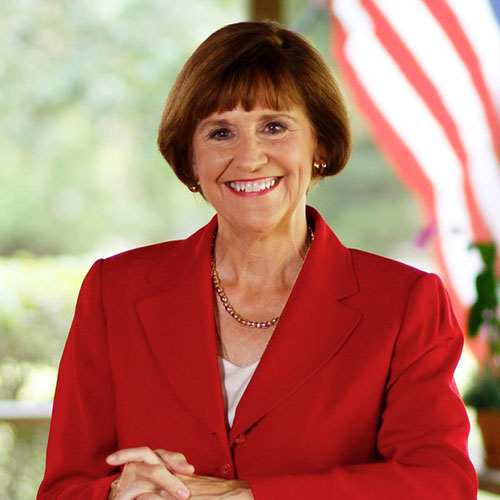With passage of bills to protect Florida’s parks and aid some of the state’s most vulnerable children, State Sen. Gayle Harrell (R-District 31) has positioned herself as a reliable vote for health access and environmental protection — a rare combination in Florida’s polarized political climate.
Harrell said recently that protecting the state’s 175 state parks from commercialization was her “number one issue” going into the 2025 legislative session, which began March 4 and ended June 16.
In fact, Harrell filed the first bill of the state’s session to block a plan by the Florida Department of Environmental Protection, which runs the parks service, to allow hotel-style lodging facilities, golf courses and pickleball courts to be built in several state parks. The plan sparked well-attended rallies against the plan with protestors chanting slogans such as “Save Don’t Pave” and “Parks Over Profit.”
Harrell’s State Park Preservation Act responded directly to that backlash and the perceived need for more public transparency and conservation authority over park management. Endorsed by environmental advocates, the bill targeted commercial facilities while allowing limited, compatible uses — such as cabins for small groups, public trails, boating, camping and wildlife observation.
“This isn’t just policy — it’s honoring public outrage and trust,” Harrell told lawmakers. “This is democracy at work.”
The bill passed both houses of the legislature unanimously and was signed into law by Gov. Ron DeSantis on May 22.
Harrell represents much of Palm Beach County north of Southern Blvd., part of St. Lucie County and all of Martin County — home to the 11,000-acre Jonathan Dickinson State Park. Located along the Loxahatchee River between Tequesta and Hobe Sound, it is home to white-tail deer, bobcats, alligators and more than 140 bird species. It is considered one of the crown jewels of the state park system.
Jonathan Dickinson was one of the nine parks initially targeted for development, and it became the epicenter of opposition to the so-called “Great Outdoors Initiative.”
“There may be a role for the state in creating public golf courses,” Harrell recently told the Town-Crier, “but not as part of our state parks.”
Harrell, 82, has been a member of the Florida Legislature since 2000 as either a state representative or a state senator. She was married to a physician for more than 50 years, is a longtime Stuart resident and advocate regarding children’s and health issues — a theme she returned to in the remainder of the legislative session.
With State Sen. Barbara Sharief (D-District 35), Harrell sponsored a bill that allows family members to become paid caregivers to “medically fragile children” living in homes that meet certain income standards.
Many families with physically or mentally challenged children “have trouble getting and keeping health aides,” Harrell said recently. “This enables family members to train, then provide the care that the child needs and be paid through Medicaid… It’s a win-win for the child.”
DeSantis signed the bill in June.
Harrell also was the senate sponsor of a comprehensive autism-support package that extends early intervention services through age four, establishes grant programs for charter schools and summer camps, and designates the University of Florida’s Center for Autism and Neurodevelopment as the state’s autism hub.
It became the first senate-passed bill of the session and was signed into law on May 27. Harrell described it as a “game changer” for families of children with autism.
Her biggest disappointment of the session was the failure of a bill she introduced, again along with Sharief, to toughen standards for nursing schools in the state. Harrell pointed out that the state is at the bottom of the medical barrel when it comes to the pass-fail rate for students taking the National Council Licensure Examination (NCLEX), which is the standard test for receiving a nurse’s license.
“We have a real problem in Florida with nursing schools,” Harrell said. “We’re the worst of the worst. We need more nurses, but many of these schools are not teaching their students well enough that they can pass the exam.”
The bill died in the Fiscal Policy Committee. “This is something we really need to try to change,” Harrell said. “I’ll be back next year.”








